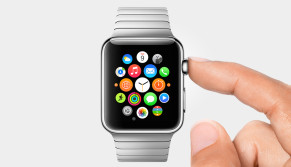
EKG Monitor May Be Included in Future Apple Smart Watches
According to Bloomberg, Apple, Inc. is currently developing an electrocardiogram (also known as an EKG or ECG) feature in its smartwatch products. A report from Bloomberg and other sources have stated that the unit in development requires users to squeeze the frame with two fingers to send a weak electrical current to the heart to pick up signals. The electrical current is used to track a user’s electrical heart signals in order to determine if there are any abnormalities such as irregular heart beats. The Verge states that “[s]ensors and data gathered from minor electric currents sent up the arm and across the chest to the user’s heart would measure data typically gathered by electrodes on the skin.” This would let users obtain a constant stream of EKG data that could then better inform doctors with diagnosis and treatment at an early stage. The CDC indicates that abnormal heart beats can increase the risk of strokes and heart failures in individuals.
The article notes that Apple’s current Watch has a basic heart rate monitor, but the company has increasingly trying to use advanced sensors to “predict future afflictions, rather than simply collect historical data about the body. An EKG would make it easier to establish the health of a user’s heart, and potentially spot some cardiac problems early.”
The article further notes that this development is not surprising as Apple has already given up marketing its smartwatch as a luxury watch. When it was first released in 2015, the Apple Watch was largely marketed as a high-end fashion piece. As the “second and third generations went on sale, the focus shifted to health and fitness, with Apple adding alerts for abnormal heart rate spikes.” Apple has now been focusing on using the Watch as a medical device. According to Jeff Williams, Apple’s chief operating officer, “[t]here’s tremendous potential to do on-device computing, to do cloud computing as well and to take that learning, and through machine learning, deep learning and ultimately artificial intelligence, to change the way health care is delivered . . . [w]e can’t think of anything more significant than this.”
Apple has already launched a new study in partnership with Stanford University that will track Apple Watch users’ heart rhythms for irregularity. The Federal Drug Administration also has cleared the Apple Watch’s first medical device accessory, an EKG reader built into a watch strap from medical device company AliveCor.
According to Bloomberg, the “health industry’s size has made it attractive for tech giants seeking new growth markets. U.S. health spending is forecast to grow from almost $3.5 trillion in 2016 to $5.5 trillion by 2025” according to data compiled by Bloomberg. Other corporate giants such as Google parent Alphabet Inc. already have two health-care divisions, while Amazon.com Inc. has for almost two decades been looking at ways to get into the pharmaceutical industry.
One of the largest hurdles for these companies to enter the medical-device market has been the the strict testing requirements imposed by the U.S. Food and Drug Administration. However, in September 2017, the FDA announced that it has chosen nine tech companies to participate in a pilot program (FDA Pre-Cert) to help tech companies bypass some regulations that have hindered health software and products release.
